Kinematic Multimode Fiber Optic Filter Cube
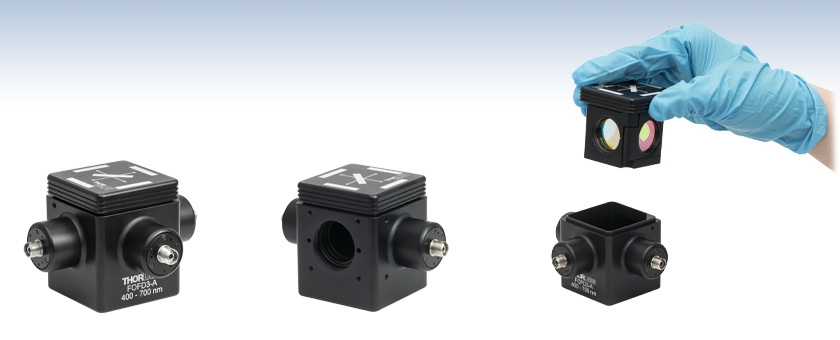
Front View
Back View
FOFD3-A
Kinematic Multimode
Fiber Optic Filter Cube
Magnetic Coupling Offers Repeatable Alignment of a Fluorescence Filter Set
Additional Cube Inserts Available Separately
- Quickly Interchange Filter Sets with Repeatable Alignment
- Three Multimode Fiber Collimator Ports & One Free Space Port
- Achromatic Performance Across the Visible Spectrum
- Mounts Ø1" Round Optics and 25 mm x 36 mm Rectangular Optic

Please Wait
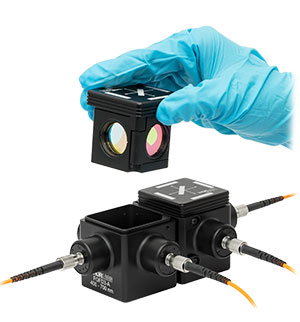
Click to Enlarge
Two FOFD3(/M)-A Cubes can be combined with a C4W-CC Cage Cube Connector. More details on experiments like these can be found in the Fiber Photometry Overview.
Features
- Kinematic Fiber Optic Filter Cube for Fiber Photometry, Fluorescence Measurements, or Multimode Wavelength Division Multiplexing (WDM)
- Three Ports with Multimode Fiber Collimators
- Achromatic: 400 - 700 nm
- Recommended for ≤0.5 NA Fibers with ≥Ø200 µm Core Diameter
- FC/PC 2.2 mm Wide Key Receptacle
- One Free-Space Port
- SM1 (1.035"-40) Internal Threads for Integration with a Power Meter or Ø1" Lens Tube
- Four 4-40 Tapped Holes Enable 30 mm Cage System Compatibility
- Includes One DFM1T1 Insert for Holding Fluorescence Filter Sets
- Includes Light-Tight Caps for Unused Fiber and Free-Space Ports
- Additional DFM1T1 Inserts Sold Separately Below
- C4W-CC 30 mm Cage Cube Connector for Connecting Two Cubes Side by Side (Sold Separately Below)
The FOFD3(/M)-A Kinematic Multimode Fiber Optic Filter Cube combines high-throughput, pre-aligned fiber collimators with the flexibility to quickly and repeatably exchange filters and dichroics for a variety of applications that require combining or separating light by wavelength. Several applications and configurations of the filter cube are shown in the Applications tab above.
Three ports of the FOFD3(/M)-A filter cube have fiber collimators for connecting an LED or laser via mulitmode fibers. The collimators provide achromatic performance from 400 to 700 nm and are recommended to be used with ≥Ø200 µm, ≤0.5 NA mulitmode mode fibers. Please see the Graphs tab above for fiber collimator performance as well as the insertion loss between a pair of fiber collimator ports. The single free-space port has internal SM1 (1.035"-40) threads, compatible with Ø1" lens tubes, Thorlabs' Standard Photodiode Power Sensors and Avalanche Photodetectors. Three plastic FC bulkhead dust caps and one snap-on SM1 plastic dust cap are included, ensuring a light tight environment for low signals.
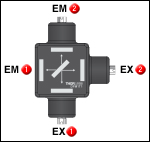
Click to Enlarge
The DFM1T1 has two excitation (EX) and two emission (EM) filter ports. Ports labeled with the same number should be used together.
Insert Details
Each FOFD3(/M)-A cube includes one DFM1T1 insert. As shown in the animation to the top right, the insert is designed to hold one rectangular dichroic filter, two excitation filters, and two emission filters. Please see the table at the bottom right for compatible filter sizes. The four SM1-threaded (1.035"-40) holes on the DFM1T1 insert each have a Ø20.5 mm (Ø0.81") clear aperture. The rectangular optic is clamped gently in place using a leaf spring that provides a uniform holding force to minimize stress. To mount the rectangular optic, remove the leaf spring using a Phillips #00 screwdriver and then insert the optic with the reflective coating face down. Only light force is needed to prevent the optic from moving; we recommend screwing in both screws most of the way before final tightening.
Excitation and emission filters can be mounted in two possible configurations (see the diagram to the right) and are held using the included SM1RR Retaining Rings, which can be tightened or loosened with our SPW606 or SPW602 Spanner Wrenches (sold separately). The cube insert is designed to be inserted in a single orientation with respect to the cube base, so it is important to orient the full cube assembly in the proper direction.
Fluorescence filters are sold separately and can be found individually or in common fluorescence imaging sets. For more wavelength options, please see our Hard-Coated Bandpass Filters, Hard-Coated Edgepass Filters, and Dichroic Beamsplitters. To help keep track of your filter sets, spaces are provided on the top of the insert to write labels for the mounted filters and mirrors.
| FOFD3(/M)-A Fiber Collimator Specifications | ||
|---|---|---|
| Operating Wavelength | 400 - 700 nm | |
| Transmissiona | LED | 60% (Typical) |
| Laser | 70% (Typical) | |
| Recommended Fiber Core Diameter | ≥Ø200 µm | |
| Recommended Fiber NA | ≤0.50 NA | |
| FOFD3(/M)-A and DFM1T1 Compatible Filters | ||
|---|---|---|
| Type | Dimensions | Thickness |
| Excitation Filtersa | Ø25 mm | ≤5.0 mm |
| Emission Filtersa | Ø25 mm | ≤3.5 mm |
| Dichroic Filters | Min: 25.0 mm x 35.6 mm Max: 25.2 mm x 36.0 mm |
Min: 1.0 mm Max: 2.0 mm |
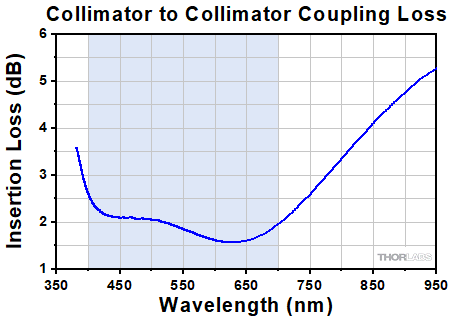
Click to Enlarge
Typical coupling loss as a function of wavelength between two collimator ports was measured using a previous-generation SLS201 Light Source, an optical spectrum analyzer, and 0.39 NA, Ø200 µm core multimode optical fiber, using the collimators in the RJ1 1x1 Rotary Joint. This performance is comparable to the FOFD3(/M)-A port to port loss. The blue shaded region indicates the recommended operating range of the fiber optic filter cube. More detailed information on the transmission between collimator ports for LED and laser light sources as well as multiple fiber core sizes and NAs can be found on the Performance Tab of the RJ1 rotary joint's web presentation.
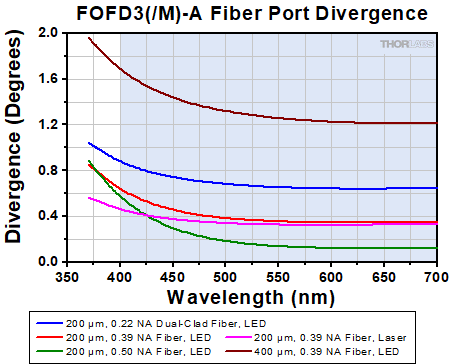
Click to Enlarge
Typical divergence from the high-NA, achromatic collimator in the FOFD3(/M)-A with multimode light sources input through 1 m of fiber is shown above. When using a laser as the input source, performance will be similar for fiber NAs from 0.22 to 0.50. The blue shaded region indicates the recommended operating range of the fiber optic filter cube.
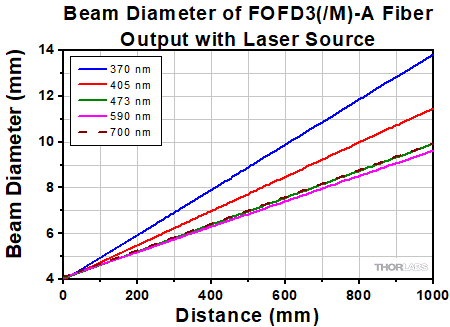
Click to Enlarge
This graph shows the typical 90/10 knife-edge measurement of the beam diameter from the high-NA, achromatic collimator used in the FOFD3(/M)-A withmultimode fiber-coupled laser input through 1 m of 0.22 NA multimode fiber; performance will be similar for fibers with NAs from 0.22 to 0.50.
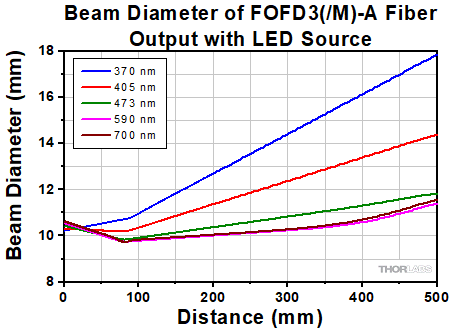
Click to Enlarge
This graph shows the typical 90/10 knife-edge measurement of the beam diameter from the high-NA, achromatic collimator used in the FOFD3(/M)-A with multimode fiber-coupled LED input through 1 m of 0.50 NA fiber.
Application Configurations
The FOFD3(/M)-A filter cube can be used in different orientations for a variety of experiments, a small subest of which are shown below. The cubes can be configured for experiments at different wavelengths by replacing the dichroic filter set and input cables without the need to realign the input or output ports.
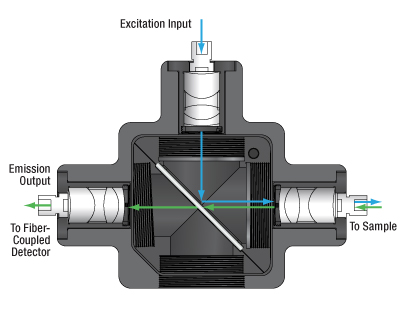
Click to Enlarge
A longpass dichroic filter in the DFM1T1 insert directs excitation light to the sample via a fiber-coupled output port. The emission light returns through that same port and passes through the dichroic filter to a fiber-coupled detector.
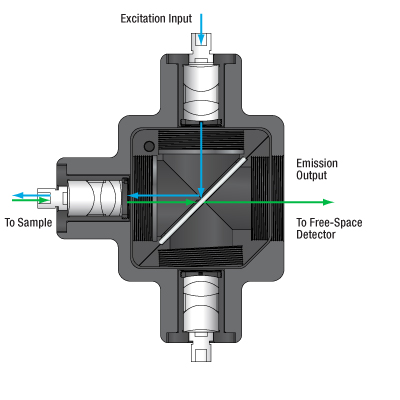
Click to Enlarge
A longpass dichroic filter in the DFM1T1 insert directs excitation light to the sample via a fiber-coupled output port. The emission light returns through that same port and passes through the dichroic filter to the free-space port, where a detector can be mounted using the SM1 (1.035"-40) internal threads.
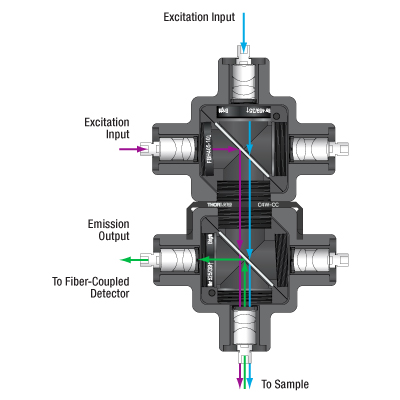
Click to Enlarge
Two cubes may be bolted together using a C4W-CC to combine two excitation wavelengths as shown in the image above. See the Fiber Photometry Overview for more information on equipment available to assemble fiber photometry experiments like the one shown here.
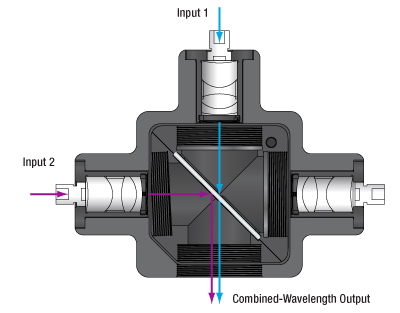
Click to Enlarge
Two different wavelengths can be combined using a dichroic mirror for wavelength division multiplexing (WDM) experiments.
| Posted Comments: | |
| No Comments Posted |
| Kinematic Cage Cubes Selection Guide (Click Image to Enlarge) | |||||
|---|---|---|---|---|---|
| Type | Empty Cubes for Fluorescence Filters |
Empty Cubes for Beamsplitters |
Empty Cubes for Right-Angle Optics |
Beam-Turning Cubes with Pre-Mounted Prism Mirrors | Multimode Fiber Optic Filter Cube |
| 16 mm Cage Cubes |  Full Web Presentation |
- | - | - | - |
| 30 mm Cage Cubes |   Full Web Presentation |
 Full Web Presentation |
 Full Web Presentation |
 Full Web Presentation |
 Full Web Presentation |
| 60 mm Cage Cubes |  Full Web Presentation |
- | 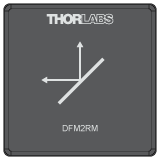 Full Web Presentation |
- | - |

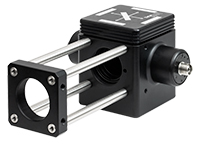
Click to Enlarge
The FOFD3-A is shown here integrated with 30 mm cage components.
- Three Multimode Fiber Optic Collimator Ports and One Free-Space Port
- Achromatic Performance: 400 - 700 nm
- Repeatable Alignment When Changing Filter Sets
- Compatible with C4W-CC 30 mm Cage Cube Connector to Connnect Two Cubes for 4-Port Applications
The FOFD3(/M)-A Multimode Fiber Optic Filter Cube enables the alignment of fiber-coupled LED and laser sources with wavelength-selective filters to quickly set up fluorescence and fiber photometry experiments.
Three ports of the filter cube feature integrated collimators that can be connected to FC/PC-terminated multimode fibers carrying signals from light sources, from samples, or to detectors. The collimators provide achromatic performance from 400 to 700 nm, are recommended for use with ≥Ø200 µm, ≤0.5 NA multimode fibers, and have 2.2 mm wide-key FC/PC receptacles. Please see the Graphs tab above for fiber collimator performance as well as the insertion loss between a pair of fiber collimator ports.
The cube also has one SM1-threaded free-space port with an optical axis height of 1.25" or 30.0 mm for the imperial or metric versions, respectively. This port is compatible with our SM1 lens tubes or can be used for direct integration of our Standard Photodiode Power Sensors. Four 4-40 tapped holes surround the free space port for compatibility with our 30 mm cage system, as shown in the image to the right.
The cube base is equipped with three bottom-located 1/4"-20 (M6) tapped holes, which provide direct compatibility with our Ø1/2" posts, Ø1" posts, or Ø1.5" posts.
The FOFD3(/M)-A fiber optic filter cube comes with one DFM1T1 insert. Additional inserts for quickly changing out filter sets are sold below. The DFM1T3 left-turning cube insert can also be used with the FOFD3(/M)-A fiber cube; however, there will be a slight decrease in transmission between fiber ports.

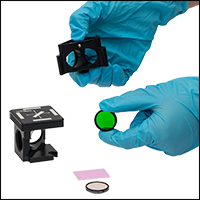
Click to Enlarge
Each DFM1T1 insert can hold one dichroic mirror, two excitation filters, and two emission filters.
- Additional Empty Inserts for Exchanging User-Provided Filters
- Holds a Fluorescence Filter Set
- Ideal for Quickly Switching Fluorescence Filter Sets in an Aligned Experimental Setup
The DFM1T1 Kinematic Fluorescence Filter Cube Insert allows users to switch between different filter sets in an aligned experimental setup. These items do not include fluorescence filters or a dichroic mirror.
The insert is designed to hold one rectangular dichroic filter, two excitation filters, and two emission filters. Please see the table in the Overview above for compatible filter sizes.The four SM1-threaded (1.035"-40) holes on the DFM1T1 insert each have a Ø20.5 mm (Ø0.81") clear aperture.
The fluoresence filters are sold separately and can be found individually or in sets targeting common fluorophores. For more wavelength options, please see our Hard-Coated Bandpass Filters and Dichroic Beamsplitters. The animation in the Overview tab above gives detailed instructions on how to install the optics in the filter cube insert. Prior to mounting the rectangular dichroic mirror, please confirm that the optic is no greater than 2.0 mm thick.
One emission port is oriented at a 3° angle with respect to the face in order to reduce undesired reflections. To help keep track of your filters, spaces are provided on the top to write labels for the mounted filters and mirrors. The cube insert is designed to be inserted in a single orientation with respect to the cube base, so it is important to orient the full cube assembly in the proper direction.

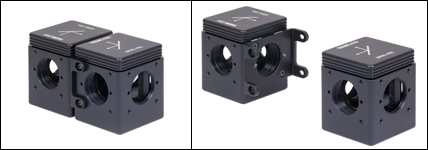
Click to Enlarge
Two DFM1-P01 Beam Turning Cubes Connected Using the C4W-CC Cage Cube Connector
- Connect Two Beam Turning, Fluorescence Filter, or Beamspliter Cubes Side by Side
- Remove and Interchange Cube Inserts while the Cube Bases are Connected
- Compatible with C4W and C6W Cage Cubes
The C4W-CC Cage Cube Connector allows two kinematic beam turning, fluorescence filter, or beamsplitter cubes to be connected together as shown in the image to the right. Two pins on the C4W-CC are accepted by drilled holes on either side of any of the SM1-threaded (1.035"-40) ports on the cage cube faces to maintain alignment. Cube inserts can still be removed and inserted while the cube bases are connected.
The C4W-CC is also compatible with our 30 mm cage cubes.
 Products Home
Products Home








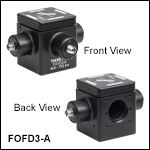
 Zoom
Zoom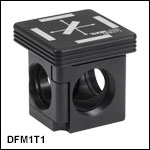
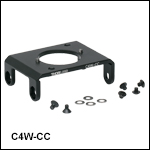
 Kinematic Multimode Fiber Optic Filter Cube
Kinematic Multimode Fiber Optic Filter Cube